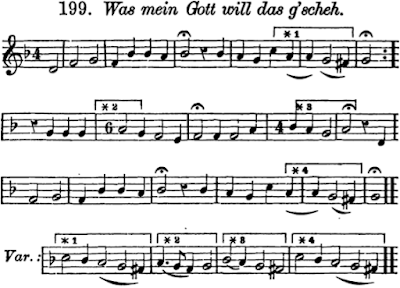Here is my translation of the psalm paraphrase, “Was haben doch die Leut im Sinn” (Cornelius Becker, d. 1604), based on Psalm 2, for which the melody “Wo Gott der Herr nicht bei uns hält” is normally assigned.
WHAT do the nations have in mind,
What can they be desiring,
Thus to rise up in fury blind?
All vain is their conspiring!
The kings within the land arise,
The lords take counsel, God despise,
And eagerly resist Him.
2 With God and Christ, the Father’s Son,
They fight with haughty spirit,
Nor leave His Word to rule alone,
But heed it not, nor hear it;
Their heart is by His Word oppressed,
Wherefore they have no peace or rest,
But from His yoke would free them.
3 In heaven mighty God doth dwell,
The champions bold deriding;
He mocks the fools who thus rebel,
The time for judgment biding,
When He in anger shall begin
To weigh their wicked works of sin,
And then in wrath dismay them.
4 I have Mine own dear Son, God saith,
As King and Heir selected;
His royal Zion, built on faith,
Was for His praise erected.
He through the Word shall rule and reign,
His kingdom everywhere shall gain,
My name to all proclaiming.
5 My Son from all eternity,
Begotten ere creation,
Raised up from death to majesty,
My joy and jubilation:
What pleaseth Thee, but ask of Me,
Thy Father, and I’ll give it Thee,
Since I cannot deny Thee.
6 The nations for Thy heritage
To praise Thee I will give Thee,
And will the world that now doth rage,
For Thy possession leave Thee.
All those who Thee no honor show
Break with Thine iron scepter’s blow
As if an earthen vessel.
7 Then be instructed, O ye kings,
And judges all together,
Fear Him as faithful underlings,
And tremble as a feather.
Yea, kiss the Son in humbleness
Lest e’er His anger merciless
Be kindled to destroy thee.
8 His anger is too great to bear
When like a fire ’tis burning;
Then follow holy doctrine e’er,
Thy blessed hope discerning;
Blest is the man who comes in fear
And puts His confidence while here
In Christ his Lord and Savior.
Translation © 2024 Matthew Carver.
GERMAN
Was haben doch die Leut im Sinn/
was wollen ſie anrichten :/:
daß ſie auffſtehn mit Ungeſtüm/
Vergebens iſt ihr Dichten/
Die Köng im Land ſich lehnen auff/
die Herren ſchließen Rat zu Hauff/
der Streit der will ſich heben.
2 GOtt und Chriſto, ſeim lieben Sohn/
mit Trutz ſie widerſtreben :/:
er ſoll ſie ungemeiſtert lahn/
ſie wolln ihrs Sinnes leben/
ſein Wort iſt ihnn ein ſchwere Laſt/
Drumb haben ſie kein Ruh noch Raſt/
ſie wolln dis Joch abwerffen.
3 Im Himmel wohnt der ſtarcke GOtt/
Der lacht der kühnen Helden :/:
der große Narrheit er zwar ſpot/
Doch werden ſies entgelten/
wann er im Zorn wird heben an/
Und fragen was ſie denn gethan/
mit Grim wird er ſie ſchrecken.
4 Ich hab/ ſpricht Gott/mein lieben Sohn/
Zum Erbkönig erwehlet :/:
Die Kirch das Königlich Zion/
Auff ſeinen Dienſt beſtellet/
Durchs Wort er wol regieren ſol/
Sein Reich anrichten uberall/
Und predign meinen Namen
5 Du biſt mein Sohn von Ewigkeit/
Ich hab dich heut gezeuget :/:
Erweckt vom Todt zur Herrlichkeit/
zu dir mein Herz ſich neiget/
Heiſche von mir was dir beliebt/
Hier iſt dein Vater der dirs gibt/
Und dir nichts wil verſagen.
6 Die Heyden zu deim Dienſt bereit/
Zum Erb ich dir wil geben :/:
Aller Welt Ende fern un weit/
Zum Eygenthumb darneben/
All die dir nicht erzeigen Ehr/
Mit einem eiſern Scepter ſchwer/
Solt du wie Töpff zerſchmeiſſen.
7 So laſt euch weiſen allzugleich/
Ihr Köng und Richter auff Erden :/:
Mit Furcht dem Herrn dient frewet euch/
Mit zitternden geberden/
Küſſet den Sohn demütiglich/
damit ſein Zorn ergrimme nicht/
Euch ſchrecklich zu vertilgen.
8 Sein Zorn iſt unertreglich ſchwer/
wenn er mit Grim entbrennet :/:
Drumb hütet euch folgt guter Lehr/
denckt wie ihr ihn abwendet/
Selig gepreyſet iſt der Mann,
der ſich umb Gottesfurcht nimpt an/
Setzt auf Chriſtum ſein Trawen.

















